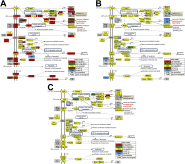Abstract
We previously found that, in a mouse model of Chagas cardiomyopathy, 18% of the 9390 quantified unigenes were significantly regulated by Trypanosoma cruzi infection. However, treatment with bone marrow-derived mononuclear cells (MNCs) resulted in 84% transcriptomic recovery. We have applied new algorithms to reanalyze these datasets with respect to specific pathways [Chagas disease (CHAGAS), cardiac muscle contraction (CMC) and chemokine signaling (CCS)]. In addition to the levels of expression of individual genes we also calculated gene expression variability and coordination of expression of each gene with all others. These additional measures revealed changes in the control of transcript abundances and gene networking in CHAGAS and restoration following MNC treatment, not accessible using the conventional approach limited to the average expression levels. Moreover, our weighted pathway regulation analysis incorporated the contributions of all affected genes, eliminating the arbitrary cut-off criteria of fold-change and/or p-value for significantly regulated genes. The new analyses revealed that T. cruzi infection had large transcriptomic consequences for the CMC pathway and triggered a huge cytokine signaling. Remarkably, MNC therapy not only restored normal expression levels of numerous genes, but it also recovered most of the CHAGAS, CMC and CCS fabrics that were altered by the infection.
